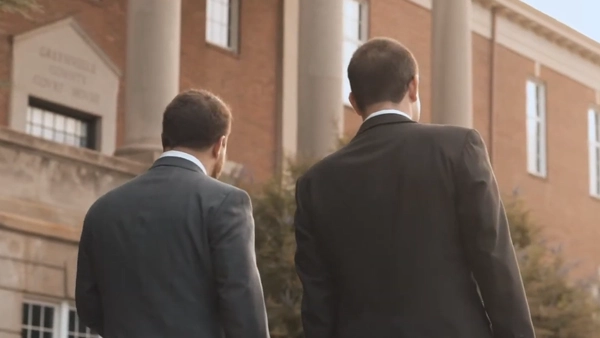If you’re facing criminal charges and conviction in Greenville, South Carolina, it can be an overwhelming situation. In some cases, you may receive a target letter before arrest if the police are investigating you for a crime. In any criminal matter, you should contact a qualified criminal defense attorney to walk you through the criminal procedure, to help you understand the charges against you, and how your plea may affect you down the line, including in related civil matters.
Arrest Procedures for South Carolina Criminal Charges
Before they can arrest you on any matter, police need to have probable cause. This means the police need to have a substantial objective belief that you committed a crime before they arrest you. This usually takes the form of a warrant for your arrest but can include a citation if the offense is one that is prosecutable in magistrate’s court and the police witnessed you commit the alleged violation.

The arresting officer must inform you of the criminal charges for which you are being arrested. They must then read you your Miranda rights before conducting any questioning while in police custody. Police will then take you to their local station where your identity is confirmed and fingerprints are taken before placing you in a cell.
Right to Bail in South Carolina
As long as you are not arrested for a capital offense or one punishable by life in prison, you have the right to petition for bail. Your bond hearing should be scheduled within 24 hours of your initial arrest. A Magistrate or Municipal Judge is the one who typically presides over a bond hearing. Their job is to evaluate information that can help them decide whether you should have bail granted. Some of the factors they take into account include whether your bail will ensure your appearance, or if there is a risk you will you run away or pose an unreasonable danger to the local community.
The judge will set the amount and conditions of your bail and inform you whether you are to appear in General Sessions Court or Magistrate/Municipal Court, and on what day. They are also the ones with the power to revoke your bond and put you back in jail if you violate any of the conditions set forth. The Magistrate may choose to deny bond in the even that your criminal charges are “violent” as defined by S.C. Code Section 16-1-60. However, you may petition the Circuit Court to set your bond in this event.
In some cases, you may be able to pay the court up to 10 percent of your bond in order to secure your release. You can also hire a bail bondsman who can pay the full bond in exchange for a fee, which can range anywhere from 10 percent to the full amount. In some matters, you may be able to post a property bond, which allows the court to place a lien on your real property, like your primary residence, if you own it.
Types of Charges Levied in Criminal Cases
Criminal charges set forth against a defendant fall under two categories: misdemeanor or felony.In Soth Carolina, misdemeanors are defined by statute and include all magistrate and municipal court offenses, all offense punishable by a maximum period of incarceration of three years, and certain common law (non-statutory) offenses punishable by a maximum period of incarceration of ten years. Felonies are more serious offenses and include everything from property crimes punishable by a maximum period of incarceration of five years to crimes like murder punishable by life in prison or death. In South Carolina, if you are convicted of a crime carrying a potential sentence of more than one year, then you cannot serve on a jury and you will be prohibited from voting while incarcerated.
Differences Between Magistrate/Municipal Court and General Sessions Court
South Carolina criminal matters are heard in several different courts, based on different circumstances.
General Sessions Court judges preside over both misdemeanor and felony cases. Penalties here can range from a minimum of over 30 days and/or a fine of $500 to a maximum of life in prison or the death penalty. Magistrate and Municipal Court judges only hear misdemeanor cases with potential penalties of 30 days or less and some 90 day offenses specifically enumerated by statute,. General Sessions Court judges are licensed attorneys, whereas Magistrate and Municipal Court judges are not required to have an active law license or to have gone to law school.
What Happens After Your Bond Hearing
After your bond hearing, your next court appearance may be your preliminary hearing. If you are charged with a case in General Sessions Court, you have the right to a preliminary hearing, which allows you to challenge whether there was probable cause for your arrest. However, you must request a preliminary hearing within 10 days of your arraignment.
Your first official court appearance is also called “roll call,” which is to be scheduled within 45 days of your arrest. Your next appearance is typically within 120 days, and this is typically where you may be offered a plea bargain. If you are released on bond and fail to show for either the first or second appearance, the judge will issue a bench warrant for your arrest.
Trial and Sentencing in South Carolina Criminal Cases
If you don’t accept the plea bargain offered, you will have a date set for your trial. During trial, the prosecution and your defense attorney will each present their cases, which can include having supporting witnesses testify. The other side has the right to cross-examine each other’s witnesses. If you are found guilty by trial, the judge will then determine your sentence. They can use several factors in helping to determine your sentence, which can include s your criminal history, the nature of your case, specific circumstances either mitigating or aggravating the facts of your case, and any other information that aids the court in determining an appropriate sentence within the sentencing range specified by statute.
The Right to Appeal When Facing Criminal Charges
You do have the right to appeal a guilty verdict; however, filing an appeal doesn’t mean your appeal will necessarily be heard. Your attorney has 10 days after the sentence is handed down to file the notice of appeal.
Contact a Greenville Criminal Defense Attorney to Discuss Your Criminal Charges
If you’ve been charged with any kind of crime in Greenville, South Carolina, then it would be in your best interest to contact a qualified and experienced attorney that specializes in criminal defense matters. Without an attorney, you are at a disadvantage and may be vulnerable to the most severe consequences in a criminal case. By hiring a knowledgeable attorney, you have the best chance of fighting a conviction or reaching a plea bargain that is fair and equitable, which helps minimize the damage a criminal conviction can cause you down the line. Please contact the lawyers at David R. Price, Jr., P.A., to learn more about your legal rights and options for criminal matters in Greenville, South Carolina.







